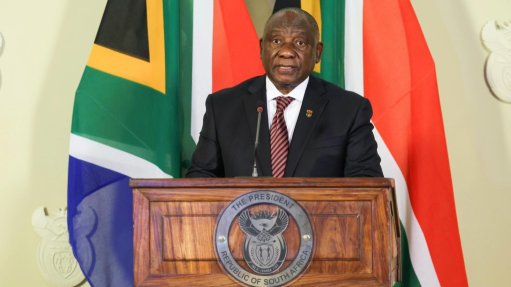Africa’s corruption reality
Graft watchdog Transparency International released its Corruption Perceptions Index (CPI) for 2024 in February, and the picture of sub-Saharan Africa it paints is not a pretty one, with the average score at a dismal 33 out of 100 index points and more than 90% of the region’s countries scoring below 50 points.
For context, a score of 100 index points is indicative of a “very clean” country from a corruption perceptions perspective, while 0 denotes corruption that stinks to high heaven. The CPI is based on perceptions of public-sector corruption by experts and businesspeople. Yes, perceptions – not hard evidence of shenanigans experienced by the experts and businesspeople – but those who know more than a thing or two about reputation and image management tell us that perceptions tend to carry a lot of weight. Conceivably, if a potential investor believes that corrupt politicians in Country X are just waiting to demand bribes, that investor will have serious misgivings about pouring his hard-earned cash into that country.
At the bottom of the barrel, both in the region and globally, sits South Sudan – Africa’s youngest nation, having come into being as recently as 2011, when it seceded from Sudan following a bloody civil war that culminated in a negotiated settlement. It scored a cringe-worthy 8 out of 100 points. Hot on its heels were Somalia, which scored 9 out 100, and Equatorial Guinea and Eritrea, both putting up a not-so-proud 13 out of 100 points.
But South Sudan’s showing is hardly surprising – the country has consistently ranked among the most corrupt countries since it first appeared in the index. The latest report comes amid growing concerns over financial mismanagement in the country, where billions of dollars in oil revenue and donor funds have reportedly been spirited away by political elites.
The United Nations, along with the World Bank and other international bodies, have long cautioned that the scourge of corruption is undermining efforts to stabilise South Sudan, a country gearing up for long- overdue elections.
And how did South Africa fare in the 2024 corruption perceptions stakes? It scored 41 points out of 100 – below its average score of 45.84 index points for the period 1996 to 2024 and far from the glory days of 1996, when it hit an all-time high of 56.8 points. Additionally, South Africa’s perceptions level falls short of the global average of 43 points.
Meanwhile, over the border, Botswana scored a credible 57 points, tying with Rwanda. Seychelles was sub-Saharan Africa’s top performer, at 72 points, while Carbo Verde came in second at 62 points.
What this latest ranking reveals is that, while we have bid farewell to the Gupta brothers and their alleged State capture shenanigans, the cancer of corruption still plagues South Africa, or, at the very least, perceptions remain that the country is deeply entangled in corruption.
But it’s encouraging that government is doubling down on efforts to tackle this scourge. A notable example is the establishment last year of the Investigating Directorate Against Corruption as a permanent entity within the National Prosecuting Authority. What’s more, as pointed out by local anti-graft organisation Corruption Watch in a recent statement, the Asset Forfeiture Unit and the Special Investigating Unit have recovered more than R10-billion from individuals and entities implicated in State capture.
Other recent wins, which President Cyril Ramaphosa highlighted when he delivered his State of the Nation Address last month, include the conviction of 1 300 corrupt individuals – including 500 government officials – over the past four years, and the enrolment of 34 cases involving nearly 200 accused persons, among them former Ministers, and some of the biggest corporates in the country, such as McKinsey and ABB.
The 2024 CPI report also spotlights a worrying link between corruption and climate change. As the number of people facing the severe effects of global warming increases, funds intended to help countries cut greenhouse-gas emissions and protect vulnerable populations are being stolen or misused. Additionally, corruption in the form of undue influence is reportedly obstructing crucial policies aimed at addressing the climate crisis.
Article Enquiry
Email Article
Save Article
Feedback
To advertise email advertising@creamermedia.co.za or click here
Announcements
What's On
Subscribe to improve your user experience...
Option 1 (equivalent of R125 a month):
Receive a weekly copy of Creamer Media's Engineering News & Mining Weekly magazine
(print copy for those in South Africa and e-magazine for those outside of South Africa)
Receive daily email newsletters
Access to full search results
Access archive of magazine back copies
Access to Projects in Progress
Access to ONE Research Report of your choice in PDF format
Option 2 (equivalent of R375 a month):
All benefits from Option 1
PLUS
Access to Creamer Media's Research Channel Africa for ALL Research Reports, in PDF format, on various industrial and mining sectors
including Electricity; Water; Energy Transition; Hydrogen; Roads, Rail and Ports; Coal; Gold; Platinum; Battery Metals; etc.
Already a subscriber?
Forgotten your password?
Receive weekly copy of Creamer Media's Engineering News & Mining Weekly magazine (print copy for those in South Africa and e-magazine for those outside of South Africa)
➕
Recieve daily email newsletters
➕
Access to full search results
➕
Access archive of magazine back copies
➕
Access to Projects in Progress
➕
Access to ONE Research Report of your choice in PDF format
RESEARCH CHANNEL AFRICA
R4500 (equivalent of R375 a month)
SUBSCRIBEAll benefits from Option 1
➕
Access to Creamer Media's Research Channel Africa for ALL Research Reports on various industrial and mining sectors, in PDF format, including on:
Electricity
➕
Water
➕
Energy Transition
➕
Hydrogen
➕
Roads, Rail and Ports
➕
Coal
➕
Gold
➕
Platinum
➕
Battery Metals
➕
etc.
Receive all benefits from Option 1 or Option 2 delivered to numerous people at your company
➕
Multiple User names and Passwords for simultaneous log-ins
➕
Intranet integration access to all in your organisation

















